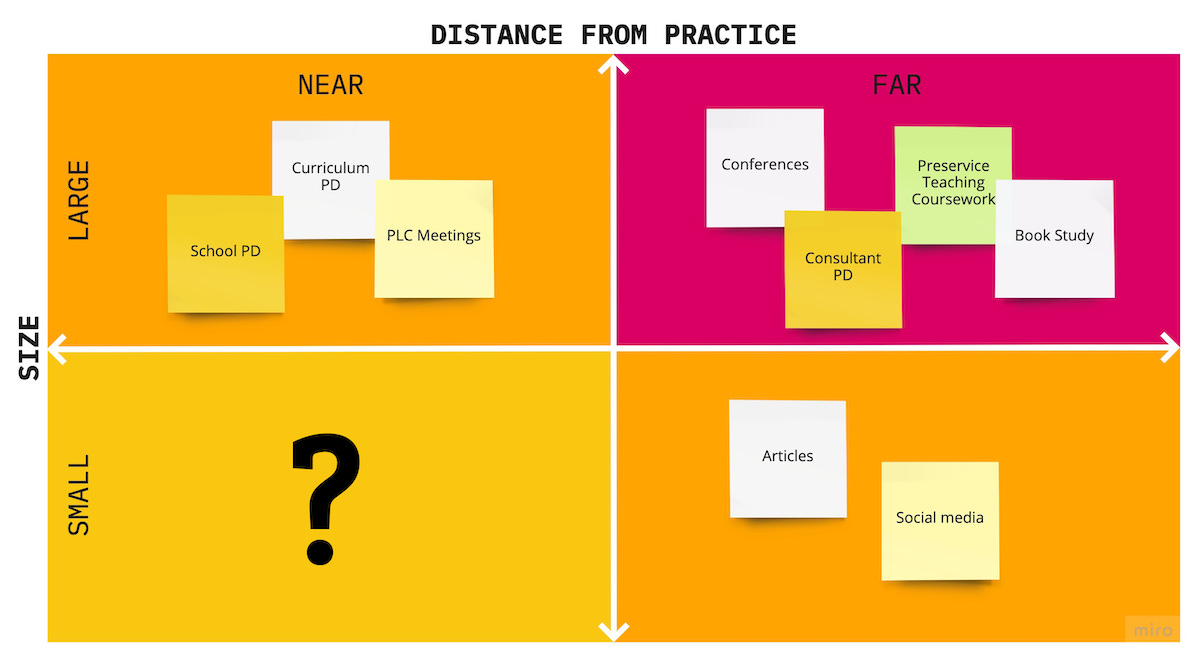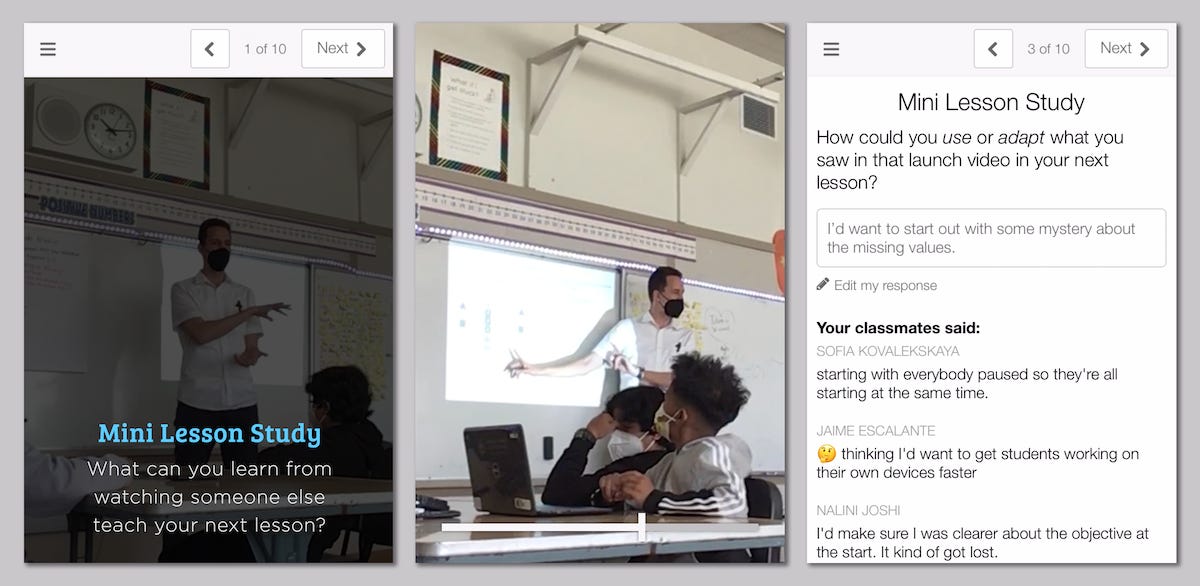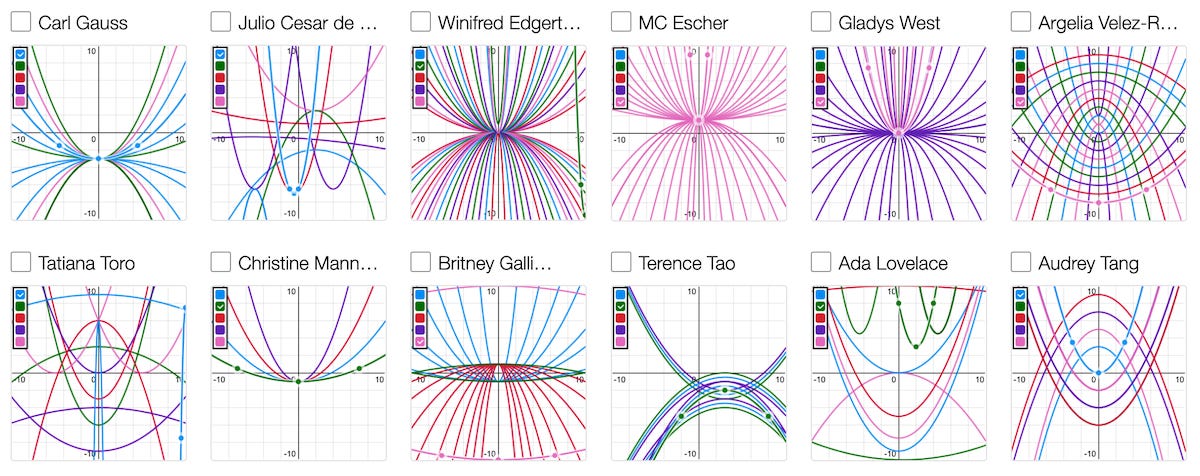Tiny Teaching Games
Something missing in teacher professional learning.
Where are the learning experiences for teachers that are a) quick and b) closely tied to practice? I'm talking about brief but meaningful experiences like Duolingo for language or Sololearn for coding where you can learn a little bit while you're in line, waiting for a show to start, or etc. I know where I can find the other experiences.
I'm not saying my categorizations are perfect here or that any of the categories are bad. But as a generalization, it's relatively easy to find professional learning experiences that are big and that require adaptation to your own context. It's harder to find experiences that are brief and closely tied to your context, closely tied to the curriculum you teach, for one example.
I'm interested in "tiny teaching games." Or maybe "micro professional learning modules" if I'm looking for grant funding. Whatever we call them, they'd help prepare teachers to teach their next lesson, specifically by helping teachers anticipate and plan a response to the vast array of ideas students bring to class every day.
How about some examples of tiny teaching games?
Okay, classroom video can be a useful “approximation of practice,” right? In our digital middle school math curriculum, we know the lesson you just taught. So we might send you two minutes of video of a teacher launching your next lesson. We might ask you what you could use or adapt from the video, and then share with you some responses from a larger group of participating educators.
Or check this out. We know how important it is for teachers to understand the objective of their lesson. We could invite you to preview your next lesson, then write what you think the objective of the lesson is in a) a sentence, b) a phrase, c) a word, and then see responses from other educators as well.
Or another. We have hundreds of thousands of student answers to every question in our curriculum. So the day before you start your next unit, you get a notification on your phone inviting you to predict the top five most common answers (which likely includes four wrong answers) to an upcoming question. Now you're less surprised by the diverse student thinking you'll encounter tomorrow.
It seems to me that key to all of these tiny teaching games are their small time commitment and the words "your next lesson." A lot of professional learning requires adaptation to your local context. These tiny teaching games would not. A lot of professional learning requires travel, time out of the classroom, or both. These would not.
Do these experiences already exist?
Should they exist?
Either way, I am having a very hard time not thinking about them.
Upcoming Speaking Engagements
I'm starting to venture out into the world. Let's hang out! (Responsibly!) Here is what's coming up.
March 24. California Math Framework Webinar. Stanford, CA. (Virtual)
March 26. Central Texas Council of Teachers of Mathematics Spring Conference. (Virtual)
April 1. Matematikbiennalen 2022. Växjö, Sweden.
April 13. Creativity, Collaboration & Communication in Math Class. Avenues School. (Virtual).
What Else?
We completed our middle school math curriculum this month and are now rolling into Algebra 1. Check out some free lessons, including the artwork of Plenty of Parabolas, and sign up for an upcoming info session.
I love these Math Snacks from my colleagues in the United Kingdom—short videos that pose accessible and expansive mathematical challenges to little and big kids.
This activity from Daniel Wekselgreene had jaws dropping around Desmos. Draw some parentheses anywhere and learn some math.
A very wealthy local district is opening up 200 slots for students from (invariably poorer) neighboring districts, prompting Andrew Simmons to reflect on his commitment to his daughter, his commitment to public education, and the tension between the two.
I'm not sure I'll read anything in 2022 that's as powerful as Audrey Watters' essay, Hope for the Future.






We all know that athletes and performers get better through deliberate practice, and I think a lot about what that would look like for me as a teacher. Your idea is a useful contribution to that inquiry! It's hard to figure out what what deliberate practice looks like for professional jobs generally and teaching specifically.
Other ideas for deliberate practice:
>> public speaking exercises (e.g. https://www.toastmasters.org/Magazine/Articles/Table-Topics-Workout)
>> content exercises (memorize the standards for your grade level? learn new math? learn new pedagogy?)
>> relationship building (gather and memorize information about your students; connect with parents systematically)
>> expand your equity world (https://arbitrarilyclose.com/mathematician-project/)
>> observe other teachers (ideally with an observation rubric to focus your attention and gather data)
>> technical practice (digital boards, scientific calculators, desmos and geogebra, scripting languages)
see: https://perell.com/essay/learn-like-an-athlete/ and Tyler Cowen's reflections on the same: https://marginalrevolution.com/marginalrevolution/2019/07/how-i-practice-at-what-i-do.html
I would say instructional coaching/peer observation/co-teaching/lesson study is the closest. That reflective conversation is so powerful and job embedded. Sadly most systems don't have coaching available and teachers often don't engage with coaching due to time. Maybe to make it more easy access have a "Instructional Coach in Your Pocket" at a set time you get a text from your coach, engage in some reflective conversation, maybe get sent a quick resource from the coach, and then off you go. Like online therapy but for teaching.